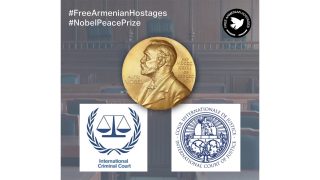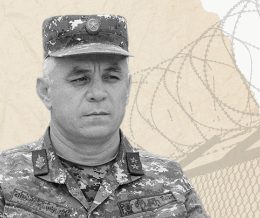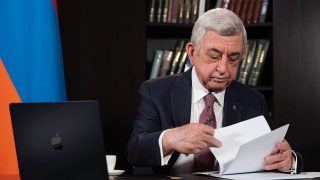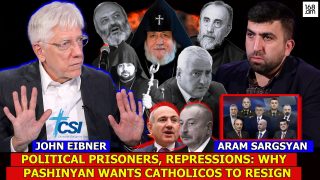
Fighting between Azerbaijan and Armenia Flares up in Nagorno-Karabakh

Heavy fighting broke out Saturday in Nagorno-Karabakh, an Armenian separatist enclave in Azerbaijan and a longtime ethnic tinderbox in the South Caucasus region, The New York Times reports.
As the fighting escalated through the day it was unclear whether the use of tanks, artillery and aircraft was merely a flare-up in a long conflict or the start of a new phase in the standoff.
Artillery barrages began early Saturday, threatening a breakdown of a fragile 1994 truce agreement. Armenia and Azerbaijan, both former Soviet republics, blamed each other for the violence.
The ethnic war that began in the late Soviet period between Armenians and Azerbaijanis claimed more than 20,000 lives and ended in a cease-fire but no final settlement. The region became one of the so-called frozen conflict zones in the vast area of the former Soviet Union, with sporadic episodes of violence since the 1994 truce.
In response to the fighting, President Vladimir V. Putin of Russia called for an immediate cease-fire on Saturday and urged both sides to show restraint. The Organization for Security and Cooperation in Europe, through the so-called Minsk Group led by France, Russia and the United States, called an emergency session to discuss the matter.
The separatist government of Nagorno-Karabakh, whose principal backers are Armenia and Armenian diaspora groups in Southern California and elsewhere, characterized the fighting as the first time since 1994 that all types of heavy weaponry — tanks, artillery and aircraft — was being used along the front line.
Armenia’s Defense Ministry said Azerbaijan launched a surprise attack using tanks and aircraft around 2 a.m. after artillery barrages intended to soften Armenia’s defenses.
Azerbaijan’s Ministry of Defense, in turn, blamed the Armenian military for the fighting. It said that its soldiers and some residential areas near the front were struck by “intensive fire” early Saturday, and that its forces had taken “urgent measures” to respond.
The Nagorno-Karabakh military said it had shot down one of Azerbaijan’s helicopters, but Azerbaijan’s military denied this report.
By midday, the fighting appeared to have expanded beyond the Nagorno-Karabakh separatist forces and Azerbaijan’s military to include Armenia’s army.
“The enemy, using tanks, artillery and aviation made attempts to get deep into the defense lines of the Nagorno-Karabakh Army of Defense and capture tactical positions,” Armenia’s Ministry of Defense said in a statement.
Interfax, the Russian news agency, cited a spokesman for Armenia’s Ministry of Defense, Artsrun Ovannisyan, as saying Armenian units were engaged in the fighting. “Now the initiative in combat is in our hands,” Mr. Ovannisyan said.
Adding to the dangers of the venomous, local ethnic hatreds between Christian Armenians and Muslim Azerbaijanis, the Nagorno-Karabakh region, an eerily beautiful mountain highland, sits on a crossroads where it is buffeted by the combustible politics of the Middle East and the former Soviet republics.
Russia and Turkey, the most important rival powers in the South Caucasus, had in recent years cooperated, however tentatively, in tamping down tensions in Nagorno-Karabakh, but they are now deeply at odds over the Syrian civil war. President Putin has accused Turkey of a “stab in the back” for shooting down a Russian fighter jet in November.
Russia has backed Armenia, while Turkey has backed Azerbaijan in the Nagorno-Karabakh conflict.
Armenia has joined a Russian-backed economic bloc, the Customs Union, while Azerbaijan has aligned with Western governments and oil industry interests, keeping its distance from Moscow.
The global oil market, as is so often the case, serves as another backdrop to the bloodshed. After a long oil boom, the drop in global prices for oil, the main source of revenue for Azerbaijan, has weakened its military, a possible factor in the outbreak of violence.
A flurry of American diplomacy this past week failed to prevent the eruption of the latest fighting.
Vice President Joseph R. Biden Jr. met the leaders of the two countries, Presidents Ilham Aliyev of Azerbaijan and Serzh Sargsyan of Armenia, separately in Washington on Thursday on the sidelines of a nuclear security summit meeting. Mr. Biden urged them to find a peaceful solution to their dispute through negotiations, the White House said.























